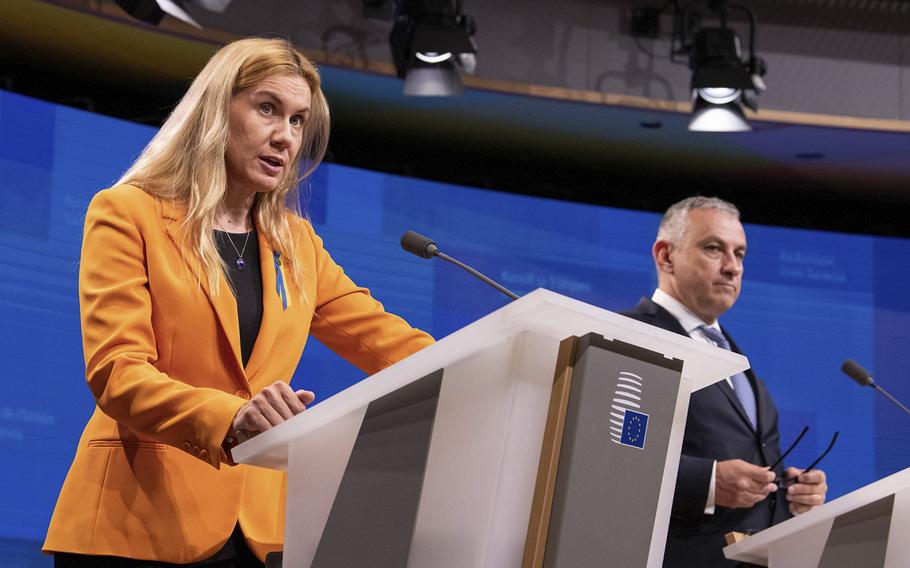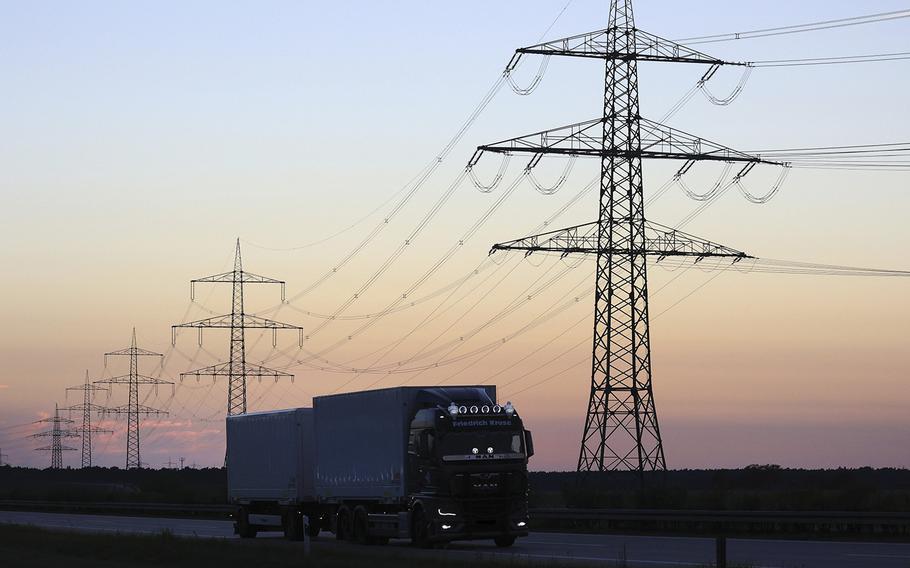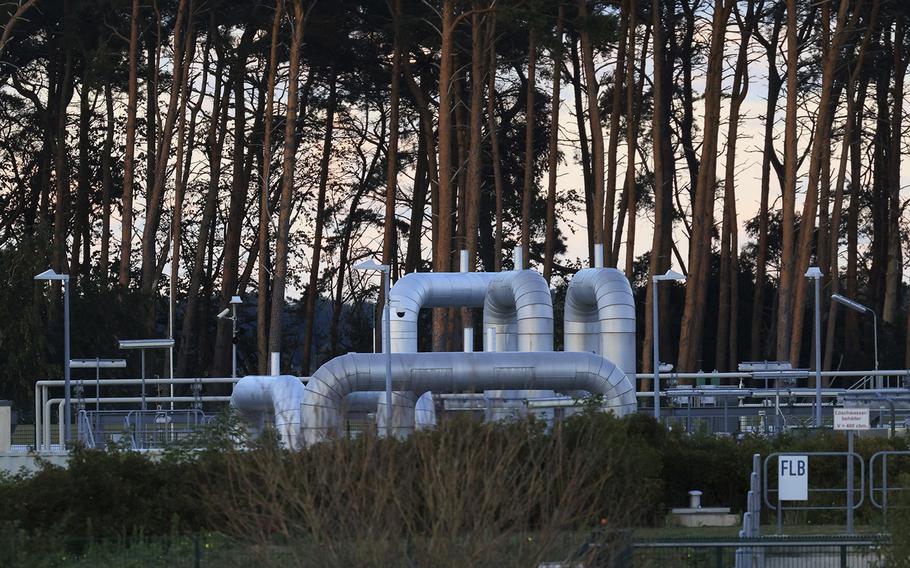Europe
Scale of Europe's energy turmoil exposed in frenzied crisis week
Bloomberg September 10, 2022

Kadri Simson, European Union’s energy commissioner, left, and Jozef Sikela, Czech Republic’s industry minister, during a news conference in Brussels on Friday, Sept. 9, 2022. (Benjamin Girette/Bloomberg )
European ministers sounded defiant as they met in Brussels to deliberate plans aimed at halting the spiral in energy prices.
"We will prevail," European Union Energy Commissioner Kadri Simson said, even with "a difficult winter ahead of us."
In reality, defiance may soon give way to desperation.
Friday's meeting in Brussels capped a frenzied week of government activity across the 27-nation bloc in which it became clear just how complex it is to forge a common response to the energy crisis given the breadth of challenges.
The refrain was that the clock is ticking for action. That's even more the case after Russia upped the ante just over a week ago, when Gazprom cut off gas deliveries to Europe via the Nord Stream pipeline indefinitely.
That sparked another round of budget-straining measures as governments announced additional aid to help people pay their bills. They were also forced to deal with a new financial threat from the crisis. As soaring energy prices leave some businesses struggling to find enough cash to meet margin calls, countries announced billions of euros in liquidity funding.
At the EU gathering, consensus remained elusive and solidarity in short supply as ministers sought to agree on measures to support citizens and businesses without wrecking the entire energy market.
Tensions bristled over proposed mandatory cuts in power demand and German calls for a mechanism to share any excess supply. Plans for a price cap on Russian gas were met with skepticism and a cap on all imported gas discussed instead. But it's unclear how lower prices could be implemented.
The discord among European leaders was amplified by a growing sense of anxiety over the economic and political fallout from the crisis.
In the Czech Republic, which holds the EU's rotating presidency, the justice minister warned that the political system was under threat. In Hungary, Cabinet Minister Gergely Gulyas raised the specter of mass unemployment if key industrial companies are forced to suspend production or shutter altogether, creating a domino effect.

A truck travels along a highway past electricity towers and power lines near Lttow-Valluhn, Mecklenburg-Vorpommern, Germany, on Aug. 24, 2022. (Krisztian Bocsi/Bloomberg )
The biggest concern in France is of a potential new chapter similar to the Gilets Jaunes, or Yellow Vest movement, which will haunt any government for the next two decades, according to a person familiar with the thinking in President Emmanuel Macron's administration.
Anything related to purchasing power is highly sensitive in France, and it simply can't afford to be in a situation like the U.K. or Belgium, where energy bills have doubled or tripled, said the person, adding that the government will continue to do all it can to avert such a scenario.
The energy crisis has been building and building since before Russian President Vladimir Putin invaded Ukraine early this year, prompting successive rounds of international sanctions and an EU decision to phase out its dependence on Russian coal, oil and, most difficult of all, natural gas.
After Nord Stream was cut off, German Chancellor Olaf Scholz convened his cabinet early Saturday to piece together a third relief package for households and companies. The negotiations with coalition allies lasted almost 20 hours until the early hours of Sunday, when they emerged with aid measures worth 65 billion euros, including higher subsidies for lower-income households and cash payments to students and pensioners.
Scholz also decided to throw Germany's weight behind EU efforts to put a levy on so-called "windfall profits" of utilities as surging earnings fuel public outrage.
Germany, he said, has a good chance to get through this winter "by the skin of its teeth." A poll later found that voters don't share that optimism, saying the measures are not enough.
According to Bloomberg Economics, Russia's decision to completely halt gas flows through Nord Stream will raise the euro area's gas bill by an extra 50 billion euros. That's on top of a 460 billion-euro hit from earlier price increases.
All told, the squeeze will exert a drag on GDP of about 2.2% annually, rising to as high as 4% if the winter is unusually cold and there's a breakdown in European unity. Even with the government support, the economy is still heading for a recession at the end of the year, say economists Maeva Cousin, Jamie Rush and Martin Ademmer.
Progress is being made. Before the invasion, Europe relied on Russia for 40% of its gas imports; now pipeline flows only account for 9%, European Commission President Ursula von der Leyen said this week. Record imports of liquefied natural gas from Norway, the U.S. and Qatar have helped offset the gap, while LNG infrastructure is rapidly being set up.

The gas receiving compressor station of the Nord Stream 1 natural gas pipeline in Lubmin, Germany. (Krisztian Bocsi/Bloomberg)
But it can't come soon enough. The talk in Brussels is of the risk of social upheaval. National governments have already earmarked billions of euros, and the energy crunch may run for years.
"Burn almost everything," Poland's de facto leader, Jaroslaw Kaczynski, told a meeting with voters last weekend, adding that the country needs to "stay warm."
In one small bit of good news, gas prices declined this week, extending their drop from August records. But they are still eight times higher than normal for the time of year, and extremely volatile. These wild movements are causing huge liquidity problems for utilities as they are asked to put up cash to guarantee their trades.
On Sunday, Sweden and Finland announced a $33 billion emergency liquidity facility to help struggling utilities and stave off what Finnish Economy Minister Mika Lintila dramatically called "the ingredients for an energy-industry Lehman Brothers" moment.
It was start of a cascade of government measures. On Tuesday, Finnish utility Fortum got 2.35 billion euros of bridge funding to ensure adequate liquidity. Switzerland granted Axpo a credit line of up to 4 billion francs ($4.2 billion).
Thursday saw the U.K. Treasury and Bank of England launch a 40 billion-pound ($46 billion) fund for energy traders to help provide market stability.
The situation in energy markets has been on the agenda of every meeting of EU leaders in the past several weeks. Von der Leyen brought forward the outline of the commission's emergency plan, but the detail will have to wait for her annual State of the Union speech on Sept. 14.
Her credibility depends on success. For Europe, though, it's existential.
"A few weeks like this and the European economy will just go into a full stop," Belgian Prime Minister Alexander De Croo said.
Bloomberg's Piotr Skolimowski, Michael Nienaber, Zoltan Simon, Jasmina Kuzmanovic, Jan Bratanic, Peter Laca, Elena Mazneva, Anna Shiryaevskaya and Simon Kennedy contributed to this report.